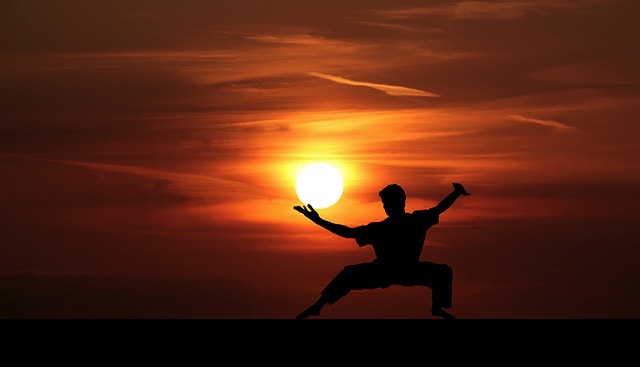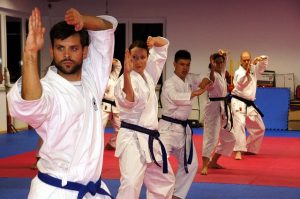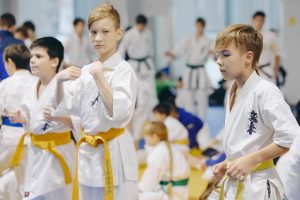 MS writes: "So many Catholics parents like myself are conflicted about allowing our children to take up the practice of karate and the martial arts. Can you give us some information and advice?"
MS writes: "So many Catholics parents like myself are conflicted about allowing our children to take up the practice of karate and the martial arts. Can you give us some information and advice?"Excellent question and one that we're often asked about!
The martial arts are much like other fitness regimes with roots in oriental mysticism; some forms incorporate more of the spiritual aspects than others with much of this depending on the whim of the instructor.
In an article he wrote about the different forms of the martial arts, B. J. Oropeza, a professor at the C. P. Haggard School of Theology at Azusa Pacific University, names Aikido, Ninjitsu, and Tai Chi as the most incompatible with Christianity.
Aikido means "the way to union with the universal force", with this force being known as "chi." Christians do not believe in, nor does science support, the concept of a "universal life force" so a practitioner of Aikido is ultimately uniting himself or herself with a false god. According to this article, Some modern aikido teachers include chants directed to Shinto spirits (kami in Japanese) as part of their classes. Students usually go along with the chanting to be part of the group but may not understand what's going on. Some may be willing to practice Shinto, but those with other religious beliefs should not be unwittingly subjected to these practices.
Ninjitsu is another form that is not compatible with Christianity. As Prof. Oropeza describes: "The Ninja tries to assimilate himself with nature in order to be more stealthy, and has a pantheistic worldview which believes all is God. The Christian believes that God is not the universe, but the Creator of the universe (Gen. 1:1-2)"
Tai Chi is off-limits because it involves the practice of Taoism. "In order to achieve physical well being, the Tai Chi student must be attuned to the universe by concentrating below the navel section of the body - which is said to be the body's psychic center," Prof. Oropeza writes. "Tai Chi cannot be reconciled with Christianity."
Taiji Quan (Tai Chi Chuan), which means supreme ultimate boxing, is also based on the existence of this universal energy. It is a martial art designed to teach the practitioner to relax the mind and body when confronting an attack so as to neutralize the attacker. Each Taiji Quan movement has an underlying mental/meditative component and it is here that Christians are likely to be introduced to Chinese philosophical principles that are not compatible with Christianity. There are many forms of Taiji Quan, but all of them have the same philosophy of relaxation of the mind and body so the body's energy can flow freely. In fact, the word Taiji refers to the yin-yang of Chinese philosophy.
The Taoist philosophy is very important to the practice of Taiji Quan. " . . . Taiji Quan is more than physical exercise; it develops the inner faculties of essence, vital energy, and the mind," says one practioner's website.
The various forms of karate can be problematic because most require meditation, which usually involves emptying the mind of distractions. In addition, the foundation of karate is known as the “budo” which means the “Martial Way.” It is derived from the word bu which means "war" and do which comes from the Chinese word for Tao and the philosophy of Taoism. Hence, karate is meant to be much more than just a fighting technique but is rather a way of life.
 For example, Kyokushin Karate, which means “ultimate truth” in Japanese, has a very strong spiritual component which makes it particularly problematic for Catholics. It combines the Zen approach to self-perfection by passive means such as meditation with the Tao quest for self-perfection through active means such as the training itself.
For example, Kyokushin Karate, which means “ultimate truth” in Japanese, has a very strong spiritual component which makes it particularly problematic for Catholics. It combines the Zen approach to self-perfection by passive means such as meditation with the Tao quest for self-perfection through active means such as the training itself.
“That which is gained through Budo is much more than just the techniques and applications of the martial arts, and it transforms all aspects of life,” explains the United States Kyokushin Karate organization.
Masutatsu Oyama, the South Korean founder of Kyokushin Karate, said “Karate is the most ZEN-like of all the martial arts. It has abandoned the sword. This means that it transcends the idea of winning and losing to become a way of thinking and living for the sake of other people in accordance with the way of Heaven. Its meanings, therefore, reach the profound levels of human thought."
He believed that any form of karate that abandoned the budo had no substance. “It is nothing more than a barbaric method of fighting or a promotional tool for the purpose of profit. No matter how popular it becomes, it is meaningless.”
The martial arts industry, which is estimated to be $8.7 in the US alone, doesn’t back away from discussions about the spirituality of its practices and how compatible they are to Christianity. In this issue of Blackbelt, the author argues that martial arts can be divorced from their religious roots, but doesn’t deny that they are inherent in the sport.
"In the martial arts, religion has an ... important role. It was crucial in the historical development of many arts, and it continues to dictate the ways in which many students think and act during practice sessions."
 It goes on to admit that, “More than a few Western students have converted to an Eastern religion simply because their martial art grew from that spiritual tradition.”
It goes on to admit that, “More than a few Western students have converted to an Eastern religion simply because their martial art grew from that spiritual tradition.”
Even though many believe that the spiritual aspects of martial arts can be divorced from the practice, are they? Is it enough that the non-Christian element may - or may not be - left out? Is it wise to leave so much up to the whim of an instructor? For the most part, we're on our own when it comes to discernment in these classes. Are we up to the task? Are we well-armed and well-practiced in our faith?
It's no secret that the last two generations of Americans are not very well catechized. This means that the average person entering a fitness/martial arts class probably not developed enough in their own religion to make the kind of distinctions that are needed to safely navigate these practices.
Professor Oropeza recommends that Christians keep the following factors in mind if he or she decides to practice a martial art:
"First, the Christian must realize that because this is a controversial area, he or she must be careful not to cause a weaker Christian to stumble by practicing a martial art (Rom. 14). Second (pri¬marily for youths), the Christian must guard against the temptation of starting fights. Third, the Christian should not allow a martial art to overshadow or detract from his Christian com¬mitments (Heb. 10:25). Finally, the Christian should pray, and examine his or her conscience and motives. These steps will insure that one’s involvement in a martial art will be based not on unworthy motives but on reflective thought."
Even though karate and the martial arts are popular ways of teaching children discipline, self-esteem and confidence, Christianity does the same thing, only without the violence and the risk to the soul.
© All Rights Reserved, Living His Life Abundantly®/Women of Grace® http://www.womenofgrace.com

